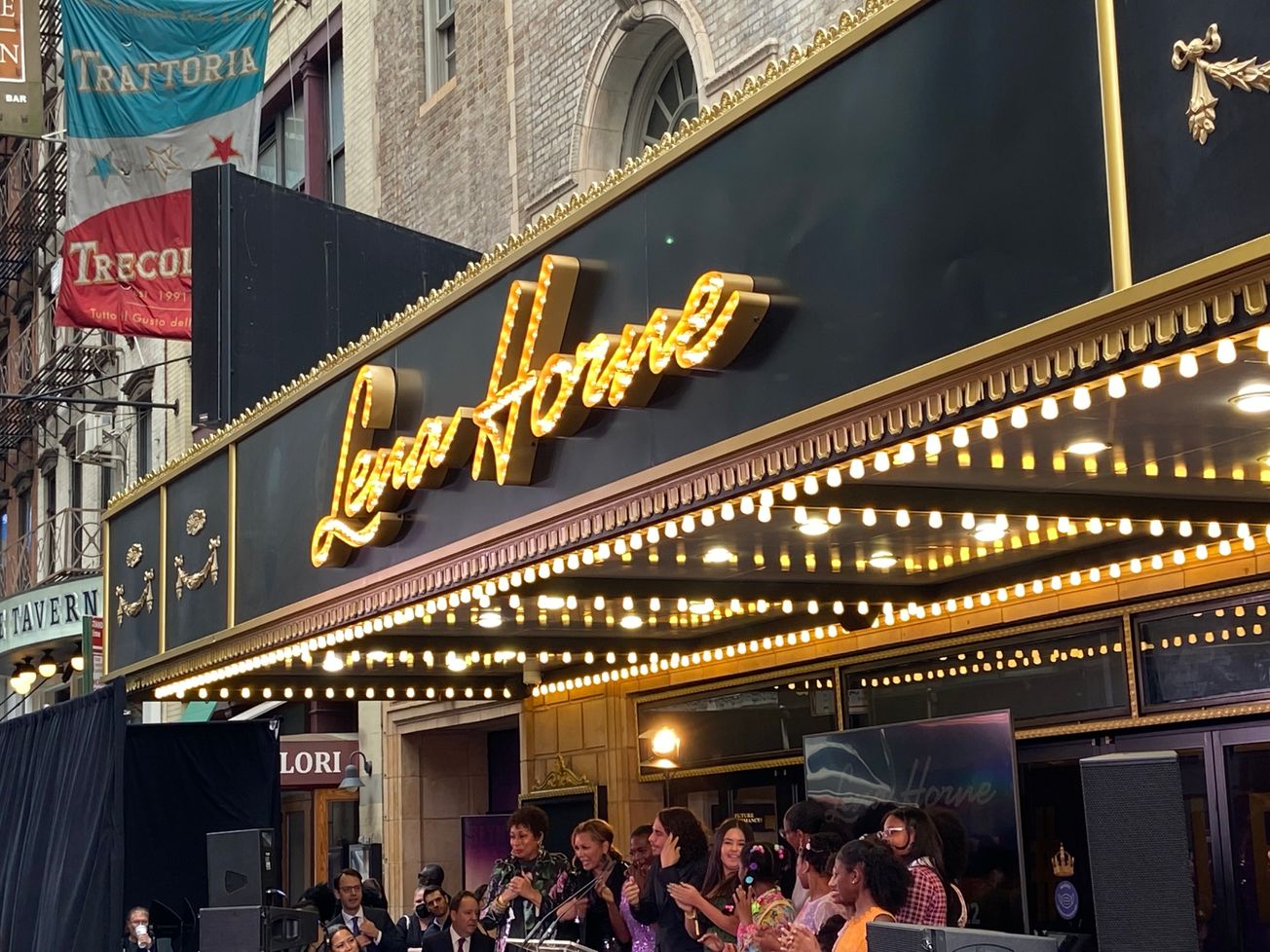The Lena Horne Theatre is the latest Broadway house to be renamed for a Black artist. On Nov. 1, the venue, owned by the Nederlander Organization and the current home of "Six," revealed its new marquee in a dedication ceremony and block party outside the theater on 47th Street.
Led by Broadway royalty (LaChanze, Audra McDonald, Tamara Tunie and Vanessa Williams, all founding members of Black Theatre United), speakers during the event also included industry stalwarts (James L. Nederlander and Nick Scandalios), those with political power (Governor Kathy Hochul, Mayor Eric Adams and NAACP Vice Chair Karen Boykin-Towns) and members of Horne's family (including granddaughter Jenny Lumet).
"The Lena," as Nederlander Executive Vice President Scandalios said the house will be nicknamed, marks the second Broadway theater to be renamed this season, as part of the New Deal for Broadway brokered by Black Theatre United. The deal stipulated that "The Shubert Organization, the Nederlander Organization, and Jujamcyn Theatres will each have at least one of their theaters named after a Black artist." Jujamcyn has long owned the August Wilson Theatre; The Shubert Organization renamed their Cort Theatre the James Earl Jones Theatre in September. The Lena (formerly the Brooks Atkinson) marks the first Broadway theater to be named for a Black woman artist.
The Nederlander Organization chose Horne, specifically, as the theater's namesake because of "her career, her civil rights activism and her personal connection" to the Nederlanders. "Lena and my dad [James M. Nederlander] had a deep mutual respect," said James L. Nederlander in his remarks. "She was a sensational performer who opened her heart to my father and I. As a producer on "˜[Lena Horne:] The Lady and Her Music,' my dad's only advice to her was "˜Lena, do what you do best.'" That show, which opened on May 12, 1981 at the Nederlander Theatre, was scheduled to run just four weeks; it played for over a year (and featured Tunie as a replacement in the ensemble).
"Lena's legacy will never die. It's because of people like her that Broadway, theater, in general, and the entertainment industry made progress in the march towards racial equality, and it is our commitment at the Nederlander Organization to continue to be a part of this movement," Nederlander continued.
Horne received a Special Tony Award in 1981 and won the Drama Desk Award that year for Outstanding Actress in a Musical for her performance in "The Lady and Her Music." She was nominated for two Primetime Emmys and eight Grammys, winning three, including a Lifetime Achievement Award. Horne earned a star on the Hollywood Walk of Fame in 1960, was inducted into the NAACP Image Awards Hall of Fame in 1982 and received a Kennedy Center Honor in 1984. Outside her career as an artist and entertainer, Horne was an activist. A member of Delta Sigma Theta, a sorority founded in 1913 by 22 collegiate women studying at Howard University, Horne and her peer Leontyne Price co-chaired the sorority's inaugural arts and letters commission to support Black women in the arts. In 2020, Michael Matuza, Jeb Gutelius and New York's Town Hall established the Lena Horne Prize to honor her legacy of "being at the center of arts and activism." Beginning in 2023, the Lena Horne Theatre will be the home of that honor and its annual ceremony.
"She had magic. She had craft. She had courage. But for me her greatest strength was her imagination," said Horne's granddaughter Lumet. "Grandma had to battle for the right to her imagination."
"To bear witness to a Broadway theater named in her honor, to take part in this momentous tribute to her legacy is a testament to the dedication to the ancestors to the efforts of countless heroes, Lena included, who sought to make positive change in the world," said McDonald in her closing remarks.
As Williams sang in her tribute, there has been "stormy weather." But as LaChanze sang in her adjusted lyrics to "I'm Here" from "The Color Purple," "Lena's beautiful. She's beautiful. And she's here."
Correction: An earlier version of this article misstated the founding year of Delta Sigma Theta Sorority, Inc. It was founded in 1913.


























































